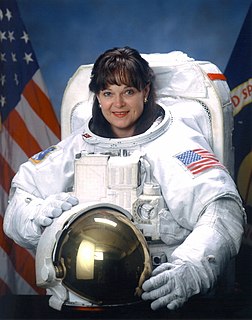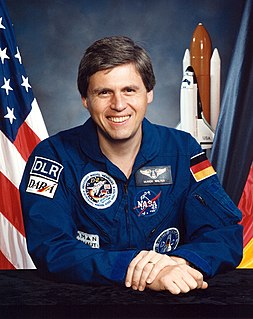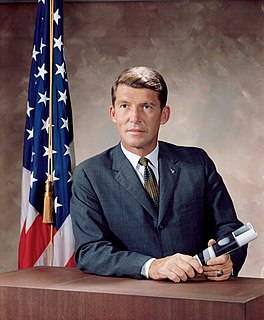A Quote by Leroy Chiao
The training kicked in and we quickly went through our emergency procedures, I took manual control and I got the spacecraft under control and stopped about 50 meters from the space station. So, the net effect of the failure was that we were actually turning and speeding up towards the space station when we should have been slowing down, so it was quite a dangerous situation. But we got manual control, performed the first manual docking to the station at night. The training pays off. It was just automatic. We had our books out already, we went right to the right procedures and executed them.
Quote Topics
About
Actually
Automatic
Been
Books
Control
Dangerous
Down
Effect
Emergency
Executed
Failure
First
Got
Had
Just
Kicked
Manual
Net
Night
Off
Our
Out
Pays
Performed
Procedures
Quickly
Quite
Right
Should
Should Have
Should Have Been
Situation
Slowing
Space
Space Station
Spacecraft
Speeding
Speeding Up
Station
Stopped
Them
Through
Took
Towards
Training
Turning
Up
Were
Related Quotes
One of the things that makes it so challenging is that we're constructing the Station hundreds of miles above the surface of the Earth and we're doing it one piece at a time For the International Space Station we do not have the privilege of assuming the Space Station is on the ground before we take it up one piece at a time. So we have to be very clever about the testing that we do and the training that we do to make sure that each mission is successful, and that each piece and each mission goes just as it's planned.
The space station mission was kind of the culmination of all of my experience of being a NASA Astronaut, so it had brought all of my previous experience into play. I had to learn the Russian language to a fluent level so that I could function as the co-pilot of the Soyuz Spacecraft that we flew up and back from the space station. And then the challenge of being the Commander of the whole expedition, a six and a-half month flight aboard the international space station. I felt the burden of the whole mission on my shoulders, which was fine, and fortunately everything did go well.
In America, we have no means of getting to our own Space Station. We have to pay the Russians to put our people up there to send them into space - rendezvous with the Station and bring them back at the end of their stay, and that to me is just wrong. We're supposed to be the world's greatest space-faring nation, and to cancel our own means of getting there I thought was a mistake, even though it would save some money.
We were trying to do as much science as we could because that was the main purpose of the international space station. But without the shuttle to bring up heavy laboratory equipment and bring back samples, we were limited by what we could do, but I was proud that we actually accomplished more science that was planned for the flight. And I got a chance to do two Russian spacewalks on that flight, I had become an expert in U.S. spacewalks and using U.S. suits and techniques, and this was a chance to put on a Russian Orlan suit and do two construction space flights outside of the space station.
When Russians were having troubles, the Space Shuttle supported the Space Station Mir bringing up much needed supplies and replacements, critical spares, really. That they were able to keep their space station going for much longer than they would have without us. So, I think that shows the value of international cooperation.
Two years ago, China tested an anti-satellite weapon that actually caused quite a bit of controversy and one of the controversies is that by blowing up a satellite, you are creating more space debris which is a hazard to satellites and spacecraft in lower Earth orbit and if they had been a partner, you'd have to do an experiment, and if they had been a partner in the international space station, would they have really done that test? They would have really thought twice about creating that tension between the countries and potentially endangering a project that they were a part of.
ISS leak is just like on a ship, there are bulkheads that, if there's an emergency, can separate an area that's no longer airtight from the undamaged portion of the station. The former Russian space station Mir actually did once develop a leak, after colliding with an unmanned cargo ship. Everyone survived.




























